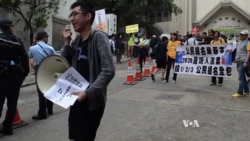HONG KONG —
Hong Kong’s election for its next chief executive is not until 2017, but debate is already heating up over how much power voters will wield.
With Beijing backing plans for a “nominating committee” to decide which candidates are eligible to run, one civic group, “Occupy Central with Love and Peace,” (OCLP) is pushing for universal suffrage.
“This is a democratic movement, we want people from different communities to get involved in the whole process," said Kinman Chan, one of the group's organizers. "So that's why we have held several deliberation days for people to understand the importance of democracy in Hong Kong and then to discuss about different reform proposals in time.”
OCLP proposes three options for the vote, all of which include so-called “civil nomination,” which would allow voters to choose any candidate.
Some of the group's supporters say the idea challenges the city-state’s mini constitution, or Basic Law, which says candidates must be chosen by a “broadly representative nominating committee,” not the public.
Beijing officials have also spoken against civil nomination, insisting that any electoral reform must comply with the Basic Law.
Political commentator Albert Cheng says the proposal is controversial even among some of Hong Kong’s pan-democrats, who believe it is too radical.
“They are thinking about the practical thing, they will try to find a solution that compromises with the central government,” he said.
According to some people in Hong Kong's downtown central district, while they do not know specifics details about OCLP as an organization, they nonetheless sympathize with the movement.
“Civil nomination is our right," said Xiong Baiji, an IT technician who works in the area. "We want to exercise that right so we can pick the candidates we want. If the Basic Law does not allow it, then we can revise the Basic Law.”
For design student He Yingxin, although OCLP might prove politically disruptive, it's for the better.
“In the discussion before any decision is made there might be some disorder and confusion. That is a necessary phase," she said. "But it is possible that after Occupy Central carries out its activities, Hong Kong will have a better future.”
OCLP has pledged to block streets of the city center in July if the election rules chosen by Hong Kong authorities turn out to be against international norms of universal suffrage.
Chinese officials say the Occupy movement damages the stability of Hong Kong, and Beijing is ready to help maintain order with troops should the disobedience get out of hand.
“I believe it is just a politics of fear," said Chan the organizer, adding that officials aim to intimidate supporters. "They understand very clearly it is not a movement to overthrow the government or try to bring own the regime in Beijing. No way we can do that.”
Political movements in Hong Kong have a record of bringing thousands of people to the streets and remain peaceful, Chan said, adding that Occupy Central will not be an exception to that norm.
With Beijing backing plans for a “nominating committee” to decide which candidates are eligible to run, one civic group, “Occupy Central with Love and Peace,” (OCLP) is pushing for universal suffrage.
“This is a democratic movement, we want people from different communities to get involved in the whole process," said Kinman Chan, one of the group's organizers. "So that's why we have held several deliberation days for people to understand the importance of democracy in Hong Kong and then to discuss about different reform proposals in time.”
OCLP proposes three options for the vote, all of which include so-called “civil nomination,” which would allow voters to choose any candidate.
Some of the group's supporters say the idea challenges the city-state’s mini constitution, or Basic Law, which says candidates must be chosen by a “broadly representative nominating committee,” not the public.
Beijing officials have also spoken against civil nomination, insisting that any electoral reform must comply with the Basic Law.
Political commentator Albert Cheng says the proposal is controversial even among some of Hong Kong’s pan-democrats, who believe it is too radical.
“They are thinking about the practical thing, they will try to find a solution that compromises with the central government,” he said.
According to some people in Hong Kong's downtown central district, while they do not know specifics details about OCLP as an organization, they nonetheless sympathize with the movement.
“Civil nomination is our right," said Xiong Baiji, an IT technician who works in the area. "We want to exercise that right so we can pick the candidates we want. If the Basic Law does not allow it, then we can revise the Basic Law.”
For design student He Yingxin, although OCLP might prove politically disruptive, it's for the better.
“In the discussion before any decision is made there might be some disorder and confusion. That is a necessary phase," she said. "But it is possible that after Occupy Central carries out its activities, Hong Kong will have a better future.”
OCLP has pledged to block streets of the city center in July if the election rules chosen by Hong Kong authorities turn out to be against international norms of universal suffrage.
Chinese officials say the Occupy movement damages the stability of Hong Kong, and Beijing is ready to help maintain order with troops should the disobedience get out of hand.
“I believe it is just a politics of fear," said Chan the organizer, adding that officials aim to intimidate supporters. "They understand very clearly it is not a movement to overthrow the government or try to bring own the regime in Beijing. No way we can do that.”
Political movements in Hong Kong have a record of bringing thousands of people to the streets and remain peaceful, Chan said, adding that Occupy Central will not be an exception to that norm.








